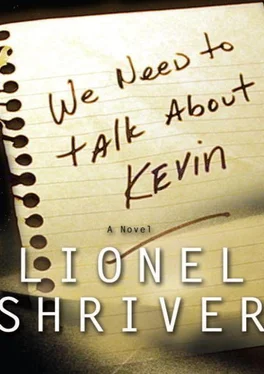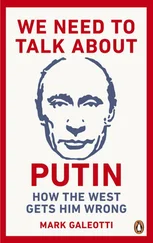Oh, you were by no means uniquely credulous; Kevin pulled the wool over his teachers’ eyes for years. I still have, thanks to you, stacks of his schoolwork. An amateur student of American history, you were the family chronicler, the photographer, the scrapbook paster, while I was more apt to regard experience itself as my souvenir. So I’m not quite sure what possessed me to rescue, from among the Stairmasters and egg slicers I abandoned en masse when I moved, the file folders of Kevin’s essays.
Did I save the files just for your tight, slanted cursive, “First Grade”? For once, I think not. I have been through two trials, if what preceded them is not to be considered a third, and I have learned to think in terms of evidence. Why, I’ve become so accustomed to abdicating ownership of my life to other people—to journalists, judges, web-site writers; to the parents of dead children and to Kevin himself—that even now I’m reluctant to fold or deface my son’s essays lest it constitute actionable tampering.
Anyway, it’s a Sunday afternoon, and I have been forcing myself to read a few. (Do you realize that I could sell these? I don’t mean for spare change, either. Apparently this is just the kind of ephemera that gets auctioned on eBay for thousands, along with the passably competent landscapes of Adolph Hitler.) Their innocent physical manifestation is disarming: the fat, characterless printing, the fragile yellowed paper. How prosaic, I thought at first; I’ll learn nothing but that, like a good boy, he did his homework. But as I read on, I grew more compelled, drawn in with the nervous fascination that leads one to poke and squeeze at an emerging cyst or a burrowing ingrown hair.
I’ve concluded that Kevin was prone to snow his schoolmasters less with that scrubbed-behind-the-ears Partridge-family buoyancy with which he greeted your return from work than with an eerie lack of affect. Kevin’s papers always follow the assignment excessively to the letter; he adds nothing, and whenever they are marked down, it is usually for being too short. There is nothing wrong with them. They are factually correct. Their spelling is accurate. On those rare occasions his teachers jot vague notes about how he might “take a more personal approach to the material,” they are unable to pinpoint anything in his essays that is precisely lacking:
Abraham Lincoln was president. Abraham Lincoln had a beard. Abraham Lincoln freed the African-American slaves. In school we study great African-American Americans for a whole month. There are many great African-American Americans. Last year we studied the same African-American Americans during African-American History Month. Next year we will study the same African-American Americans during African-American History Month. Abraham Lincoln was shot.
If you don’t mind my weighing in on Kevin’s side for once, you and his teachers thought all through primary school that he needed help on his organizational skills, but I’ve decided that his organizational skills were razor sharp. From first grade on, those assignments demonstrate an intuitive appreciation for the arbitrary, for the numbing powers of repetition, and for the absurdist possibilities of the non sequitur. More, his robotic declaratives do not indicate a failure to master the niceties of prose style; they are his prose style, refined with all the fastidiousness that attended H. L. Mencken’s. Uneasy intimations to us at parent-teacher conferences that Kevin “didn’t seem to put his heart into his schoolwork” to the contrary, Kevin did put his heart into his work, his heart and soul. Check out this fourth-grade rendition of the assignment, “Meet My Mother”:
My mother goes somewhere else. My mother sleeps in a different bed. My mother eats different food. My mother comes home. My mother sleeps at home. My mother eats at home.
My mother tells other people to go somewhere else. Other people sleep in a different bed. Other people eat different food. Other people come home. Other people sleep at home. Other people eat at home. My mother is rich.
I know what you’re thinking, or I know what you thought then. That it was Kevin’s surly, remote pose with me that was fake, while with you he could relax and be his sprightly, chipper self. That the pervasive stiltedness of his written work revealed a commonplace gap between his thoughts and his powers of expression. I’m willing to grant that his closed condescension toward me was an artifice, even if its biding-time quality, tracing back to my appropriation of his squirt gun, felt true. But neither the Beaver Cleaver nor the windup schoolboy straight man was any less bogus. Kevin was a shell game in which all three cups were empty.
I just glanced over what I’ve written so far and realized that I was being awfully summary about a solid seven years of our lives together; moreover, that the abundance of that summary concerned Celia. I’m ashamed of this, I really am, but while I can remember how we spent every one of Celia’s birthdays during those years, my memories of Kevin from the age of eight to about fourteen tend to blur.
Oh, a few bits and pieces stick out, especially my disastrous attempt to impart the enthusiasms of my professional life by taking you and thirteen-year old Kevin (you’ll recall that Celia, too young, stayed with my mother) to Vietnam. I deliberately chose that country because it’s a place that to any American, at least of our generation, inescapably means something, saving it from the dissociated Just Somewhere Else and Who Cares feeling that foreign countries so easily induce when you visit them for the first time, and to which Kevin would naturally fall prey. Too, Vietnam had only recently opened up to tourism, so I couldn’t resist the opportunity on my own account. But I grant that this sense of connectedness, of guilty intimacy with rice paddies and wizened old women in conical straw hats, would pertain mostly to you and me. I’d marched on Washington in my twenties, while you had actually begged the Draft Board, if to no avail, not to reject you because of flat feet; with Saigon already fallen three years before, we had some bracing knockdown drag-outs over the war when we met. Kevin had no such associations, so maybe despite my intentions to the contrary, I had indeed dragged him to Just Somewhere Else and Who Cares. Nonetheless, I’ll never forget my stinging humiliation when our son—if nothing else, ever a quick study—sauntered through the sea of scooters in Hanoi telling the “gooks” to get out of the way.
However, one other memory rises eidetically above the blur, and it is not, Franklin, one more mean, slanderous example of how our son was heartless from birth.
I refer to that two weeks when he got so sick. He was ten. For a while, Dr. Goldblatt worried that it was meningitis, though an excruciating spinal tap only proved that it wasn’t. Despite his poor appetite, Kevin was generally a healthy boy, and this was my only experience of our son laid so low for so long.
When he first started coming down with it, I noticed that the spirit in which he turned up his nose at my meals was no longer sneering; he’d look at his plate and slump, as if in defeat. In fact, since he was accustomed—like his mother—to battling his own impulses as much as outside forces, he struggled to stuff down one of my lamb sarma before giving up. He didn’t lurk in shadows or march martinet-style down the hall but began to wander, sagging against furniture. The rigid set of his face went limp and lost that smirking sideways skew. Eventually I found him curled helplessly on my study’s ink-stained Armenian carpet, and I was astonished that when I helped him up and lifted him to bed that he offered no resistance. Franklin, he put his arms around my neck .
Читать дальше












